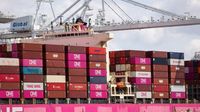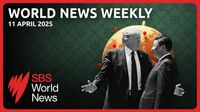On April 11, 2025, economic discussions took a prominent turn as Kai Ryssdal, host of "Marketplace," engaged with Heather Long from the Washington Post and Jordyn Holman from the New York Times to dissect the week’s economic news, highlighting a notable decline in consumer sentiment. The conversation delved into the implications of recent tariffs and their broader impact on the economy.
Consumer sentiment, a critical indicator of economic health, has been on a downward trajectory, raising concerns among economists and policymakers alike. Ryssdal, Long, and Holman examined the factors contributing to this decline, which many attribute to increasing inflation rates and a lack of confidence in the current economic climate.
“Consumer confidence is essential for a robust economy,” Ryssdal stated during the discussion. “When people are worried about their financial future, they tend to cut back on spending, which can lead to a slowdown in economic growth.”
Meanwhile, the podcast episode from SBS News on the same day brought to light the fallout from former President Donald Trump’s 'Liberation Day' tariffs. This specific set of tariffs has sparked significant debate regarding its effects on both domestic and international markets. Catriona Stirrat and Claudia Farhart hosted a discussion featuring insights from Steven Hamilton of George Washington University and Chief International Correspondent Ben Lewis.
The tariffs, originally designed to protect American industries, have faced criticism for potentially stifling trade and increasing costs for consumers. “The long-term effects of these tariffs are still unfolding,” noted Hamilton. “While they might provide short-term relief for some sectors, the overall impact could be detrimental if it leads to retaliatory measures from other countries.”
As the conversation progressed, the panel also addressed Israel's ongoing military actions in Gaza, which have drawn international scrutiny. The renewed assault has raised questions about humanitarian conditions in the region and the potential for escalating violence.
“The situation in Gaza is dire,” said Lewis. “With each passing day, the humanitarian crisis worsens, and the prospects for peace seem increasingly distant.”
In addition to discussing the Israel-Palestine conflict, the podcast explored whether Iran might reengage in negotiations regarding its nuclear program. This topic has significant geopolitical implications, especially in light of the recent tensions in the Middle East.
“The possibility of Iran returning to the negotiating table is a complex issue,” Farhart remarked. “It hinges on various factors, including the current stance of the U.S. and its allies, as well as Iran’s internal political dynamics.”
Both discussions highlighted the interconnectedness of global events and domestic economic conditions, emphasizing how international policy decisions can reverberate back to consumer sentiment and spending habits in the United States.
The economic landscape, as articulated by Ryssdal, Long, and Holman, reflects a challenging environment for consumers. Rising prices in essential goods, coupled with uncertainty regarding future economic policies, have led many to adopt a more cautious approach to spending.
“When consumers feel insecure, they save more and spend less,” Ryssdal explained. “This can create a cycle that further depresses economic growth.”
As the week unfolded, it became increasingly clear that the ramifications of these tariffs and international conflicts would likely dominate economic discourse in the coming months. The discussions from both "Marketplace" and the SBS News podcast reveal a landscape fraught with challenges, where decisions made in one arena can have ripple effects throughout the global economy.
In conclusion, as analysts and policymakers navigate these turbulent waters, the need for clear communication and strategic planning has never been more critical. With consumer sentiment waning and geopolitical tensions rising, the path forward will require careful consideration of both domestic and international factors affecting economic stability.





